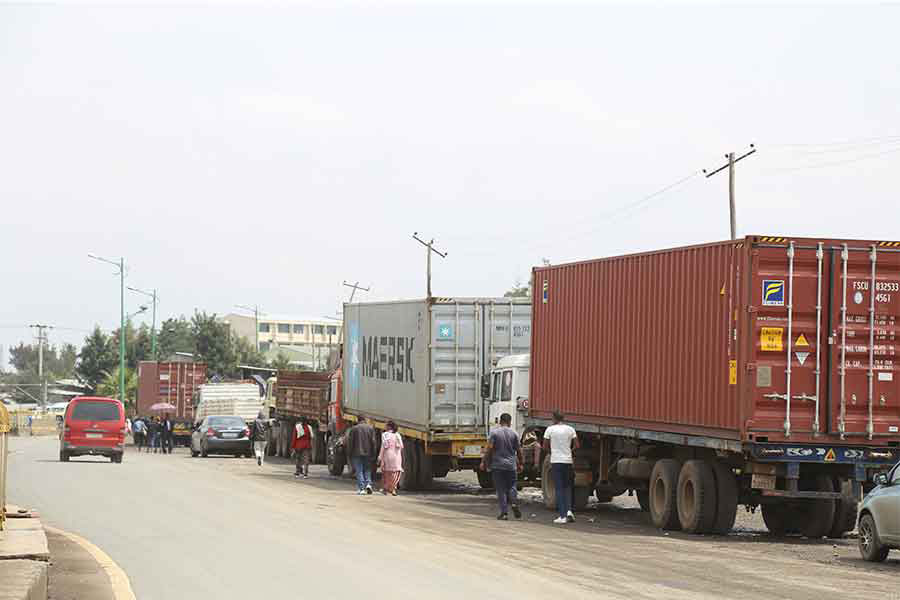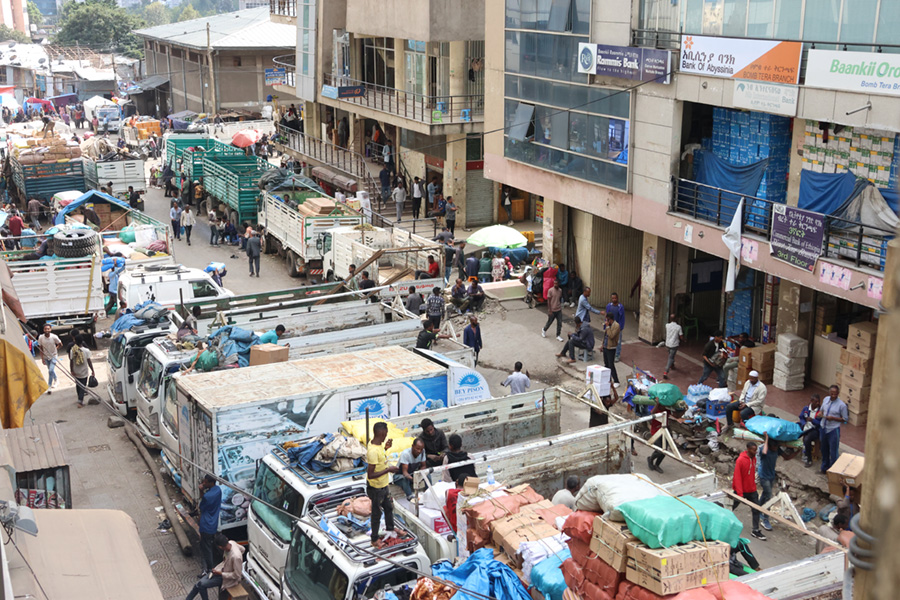
Fortune News | Oct 31,2020
On the morning of Wednesday, July 17, 2019, an old white Peugeot truck that belongs to Shewit Mebratu was parked near Addis Abeba Qality Customs Branch Office.
Born and raised around the neighbourhood of Qera, Shewit, who is in his mid-30s, has lived most of his adult life driving heavy trucks. His fascination with the big trucks began at an early age.
"I used to spend my summer breaks working in a nearby garage," Shewit told Fortune.
After finishing high school, he started his journey as a full-time technician. Due to the nature of his job, he came in contact with long-distance drivers who told him stories about the road that enticed him.
"For a young man, going far away from home and seeing all those things was very interesting," he said.
He started working as an assistant on the trucks that went to Djibouti, and through the years he became more experienced at driving trucks.
Shewit says long-distance driving was a tough job, but he got used to life, and it became his profession.
Eight years ago, he got married and started a family. It became difficult for him to do long distance transportation, due to staying away from home for long periods. He decided to work in the capital transporting goods from Qality Customs Branch Office. He started to transport imported material from the Customs Branch Office to their final destinations.
Last week, he was on duty transporting blankets and sheets from the Customs Office to a warehouse in Merkato, the largest open market in the capital.
His truck, which has a capacity of carrying four tonnes, waited for two days in a long queue to load the items. Even after loading, he remained parked for an entire day at the place where Fortunemet him last week.
Shewit was forced to spend the day at the place where he parked his truck following the ban imposed by the City Administration restricting the movement of heavy trucks in the capital during the day time. To enter the city, Shewit has to wait until 8:00pm. Put into effect on July 7, 2019, the ban prohibits heavy trucks that weight over 2.5tn.
Lighter freight trucks, which weigh between 2.5tn and 3.5tn, are not able to move from 6:30am to 10:00am and from 4:00pm to 8:00pm. Heavier trucks that weigh more than 3.5tn are banned from moving around within the city from 6:30am to 8:00pm.
The new directive from Addis Abeba Road & Transport Bureau also forbids the trucks from being parked on city roads during the day when the ban is in effect.
Minimising traffic congestion, accidents and air pollution are the main motivations that triggered the ban, according to Semer Jelalo, deputy director at the Addis Abeba Traffic Management Agency.
The trucks were banned with the view of minimising traffic congestion, accidents and air pollution caused by the vehicles.
Before enforcing the ban, the authorities of the City Administration say that they commissioned a study to learn the cause of the traffic congestion in the capital, which has 60pc of the total vehicles in the country.
Addis Abeba has 1,127 Anbessa, Sheger and Public Service buses, 100 Sheger student buses, 423 Higer midibuses and 14,213 minibus taxis. The city also has about 120,000 trucks that can carry more than one tonne.
The City administration hired an Indian firm to conduct an assessment of transport and logistics efficiency of the city, where transportation costs have reached an estimated 2.3 billion Br a day.
The finding shows that the 585,000 vehicles in the capital make 4.2 million trips a day.
The ban was put into effect with the simple goal of reducing at least 10pc of the city’s congestion, according to Solomon Kidane (PhD), economic cluster coordinator at the rank of deputy mayor.
"It can greatly minimise the logistics cost and problems in the city," Solomon said.
The City Administration offers transporters who really needs to move in the city during the banned hours a mechanism. When deemed necessary, the Addis Abeba Traffic Management Agency can issue special permits to the trucks.
To move between 10:00am to 4:00pm, heavy trucks have to pay 500 Br a day for two months and double that value for 24-hour movement.
If the trucks install a tracking device, which can be connected to the authority’s system, they will get a 75pc discount.
Residents and drivers in the city testify that the ban has brought relief for the city that had been challenged by heavy congestion.
Belay Shieferaw, who has been driving for more than four decades in the city, cheers on the ban.
"The traffic congestion has indeed decreased, since the ban came into effect," Belay said.
However, it is shattering the livelihoods of heavy truck drivers like Shewit.
Shewit, who claims that it has completely changed his lifestyle, insists that the ban blindsided him and has not taken into consideration various factors.
Residents and drivers already claim to see the effect of the ban, which has brought traffic relief for the city. A road in Aqaqi Qality District is seen with fewer trucks.
"We can’t just shift our work to nighttime even if we wanted to," said Shewit. "Warehouses, government offices and the businesses we work for and with are closed during nighttime."
The drivers also raise security and safety concerns and unavailability of repair services at night.
The ban was also a blow to many businesses that depended on the heavy trucks such as contractors, suppliers and exporters of perishable goods like flowers, fruit, milk and meat sellers, as well as those engaged in the import and export business.
While contractors argue that they can not operate at night for safety and quality reasons, exporters claim that they cannot accommodate the ban as there are flight schedules they have to catch.
Export of coffee has also suffered a lot from the ban, according to Heiru Nuru, director of market information & regulation at the Ethiopian Coffee & Tea Development & Marketing Authority.
"Coffee export decreased by half last week compared to the week before the ban became effective," said Heiru.
In the just-ended fiscal year, the country generated 800 million dollars from the export of 240,000tn of coffee. The value is almost one-third of total commodity export revenues.
Day to day activity of the Addis Ababa Qality Customs Branch Office was also significantly affected by the new law, according to G. Egziabher G. Tsadik, deputy director of the Branch Office.
"Before the ban, we used to handle up to 400 trucks a day, but now the figure went down to 150 cars," G. Egziabher told Fortune.
To keep up with the change, the Branch Office has already started a night shift.
Encouraging nighttime activities is also the other aim of the ban, according to Akalu Assefa, deputy director at Addis Abeba City Administration Transport Authority.
“Wake up Addis Abeba, a city that’s dead at night,” said Akalu.
Addis Abeba Abattoirs Enterprise and Addis Abeba Solid Waste Administration Agency were also forced to be dependent on night shift activities.
"We have been working in 24-hour shifts as we couldn’t meet the demand," said Haymanot Zeleke, deputy director at the Agency, adding that they are supposed to dispose of the waste of the city, which produces 32,000tn of garbage a day. "The new ban has made the daytime useless."
Overwhelmed with complaints lodged against the new directive, the City Administration held a stakeholder meeting last week.
“We are not asking the impossible,” said Solomon during the meeting. “The only question is whether the city is ready to change?”
The City Administration officials, who claim that most of the problems were foreseen in the study, has made some adjustments after the ban, including allowing city solid and sewage disposal agencies to operate during day time temporarily.
Exporters of perishable goods were allowed to move without restrictions, but they still have to pay the 1,000 Br fee.
"Though we appreciate being given permits," said Tewodros Zewde, executive director of Ethiopian Horticulture Producer Exporters Association, "we can’t continue to pay a 1,000 Br a day fee for the trucks in the long run."
The Ministry of Transport is also by the side of the ban saying it goes along with the national logistics plan of the country.
The government is also working on options to let import-export trucks pass through a few selected and designated roads, according to Hiwot Mosisa, state minister for Transport.
"They will use the roads after installing GPS systems," she said.
However, some experts disagree and warn that the City Administration is biting off more than it can chew.
"The consequences of the ban are beyond the control of the City Administration and will very soon materialise," said Fekadu Gurmessa (PhD), an expert in the area of transport geography for more than two decades.
The concentration of various urban activities in one area and the growth rate of vehicles, which is more than double the population growth, are the primary reasons for the jam, according to Fekadu.
Moreover, Fekadu argues that the ban will fail to meet its desired goal as the City Administration is trying to address the problem in the wrong way.
Introducing a motorisation policy as well as upgrading its land-use policy and public transit, enforcing the use of high occupancy vehicles and limiting the ownership of multiple cars by one person can be solutions, according to Fekadu.
While businesses and institutions are organised and start negotiations with city officials to address their problems, the drivers remain voiceless, according to Shewit.
"This is the only profession I know, and it’s too late for me to learn a new one," said Shewit. "Unless the city comes to accommodate us, I am out of work."
PUBLISHED ON
Jul 20,2019 [ VOL
20 , NO
1003]

Fortune News | Oct 31,2020

Radar | Jun 05,2021

Fortune News | Aug 06,2022

Viewpoints | Nov 12,2022

Fortune News | Jun 08,2024

Fortune News | Jul 18,2020

Agenda | Sep 22,2024

Fortune News | Jun 23,2019

Agenda | Nov 24,2024

Radar | Sep 03,2022

Dec 22 , 2024 . By TIZITA SHEWAFERAW
Charged with transforming colossal state-owned enterprises into modern and competitiv...

Aug 18 , 2024 . By AKSAH ITALO
Although predictable Yonas Zerihun's job in the ride-hailing service is not immune to...

Jul 28 , 2024 . By TIZITA SHEWAFERAW
Unhabitual, perhaps too many, Samuel Gebreyohannes, 38, used to occasionally enjoy a couple of beers at breakfast. However, he recently swit...

Jul 13 , 2024 . By AKSAH ITALO
Investors who rely on tractors, trucks, and field vehicles for commuting, transporting commodities, and f...

Jul 5 , 2025
Six years ago, Ethiopia was the darling of international liberal commentators. A year...

Jun 28 , 2025
Meseret Damtie, the assertive auditor general, has never been shy about naming names...

Jun 21 , 2025
A well-worn adage says, “Budget is not destiny, but it is direction.” Examining t...

Jun 14 , 2025
Yet again, the Horn of Africa is bracing for trouble. A region already frayed by wars...